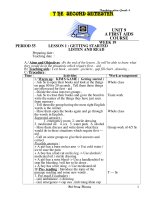Course overview 1234567
Bạn đang xem bản rút gọn của tài liệu. Xem và tải ngay bản đầy đủ của tài liệu tại đây (147.45 KB, 7 trang )
COURSE OVERVIEW:
CTL.SC3x Supply Chain Dynamics
Fall Semester 2016
KEY DATES
Course opens at 1500
hours UTC (11:00 AM
EDT) - the first week's
24
materials will be
Aug
released and each
ust
week’s material will be
2016
released on subsequent
Wednesdays at 1500
hours UTC
07
Sept Course enrollment
embe closes – last day to
r register for course
2016
09 Verified Status closes
Sept – last day to convert
embe from Audit to Verified
r Certificate and last day
2016 to become ID Verified
21
Sept
embe Midterm Exam opens
r
2016
28
Sept
embe Midterm Exam is due
r
2016
19
Octo
Final Exam opens
ber
2016
26 Final Exam is due and
Octo class closes
ber
2016
02
Certificates are made
Nove
available on your edX
mber
dashboard
2016
SC3x STAFF
Dr. Chris Caplice
Instructors Professor Yossi Sheffi
Dr. Bruce Arntzen
Dr. Chris Caplice
Dr. Eva Ponce
Dr. Roberto Perez-Franco
Dr. Omar Sherif Elwakil
Teaching
Ms. Shruti Banda
Team
Mr. Maximiliano Calderón
Mr. Jack Yao
Ms. Verónica Stolear
Ms. María Carolina Méndez
Community
Mr. Arthur Grau
Manager
COURSE DESCRIPTION
CTL.SC3x Supply Chain Dynamics addresses the challenges and issues that arise with
supply chains operating in the real world. Supply Chains are complex systems involving
multiple firms and organizations with different goals and objectives. Additionally, there
are external forces and trends that can impact (positively or negatively) a supply chain’s
efficiency and effectiveness. Understanding the dynamics and risks within supply
chains, both large and small, is key to being a successful supply chain
professional. This is one of the five courses required to complete the MITx
MicroMasters Credential in Supply Chain Management. A full explanation of
the MicroMasters Credential can be found here.
The course is divided into two sections: tools and techniques (weeks 1-3) and
challenges (weeks 5-7). There will be exams in weeks 4 and 8. In the tools and
techniques section we will present and demonstrate a number of methods and concepts
available to the supply chain professional to better understand their supply chains.
These include supply chain complexity, system dynamics, process analysis, queueing
theory, process mapping, and strategic alignment. In the second section, we dive into
global supply chain management and supply chain resilience to illustrate where these
complexities arise and how to best address them.
COURSE ORGANIZATION
CTL.SC3x is divided into eight weeks: six content-based weeks and two exam-based
weeks. With the introduction of the MicroMasters Credential, the importance
of assessment has been elevated to a higher level than in previous courses.
COURSE OVERVIEW & LOGISTICS
Week 0 includes some information on course logistics and background material that
should help you prepare for the course.
CONTENT-BASED WEEKS
Weeks 1 through 3 and weeks 5 through 7 are the course content-based
weeks. Each of these weeks is comprised of a number of sub-sections that include:
•
Welcome to the Week Video – a short (<2 minutes) video
welcome from that week's primary instructor providing an
overview of what will be covered in the coming week.
•
Interactive Lessons – each week will have 2 lessons. Each
lesson consists of a bundle of short videos interspersed with Quick
Questions and discussions. Each video is between 2 – 12 minutes
in length with the total duration of videos in a complete lesson
ranging from 40 minutes to just over an hour. They are designed
to be watched in one sitting – but need not be. The Quick
Questions within each lesson are not graded, but rather help
reinforce the concepts introduced in the videos. For each lesson,
you are able to download PDFs of a complete set of slides (both
annotated and unannotated if applies) as well as a Key Concepts
document that contains summaries of the lessons, primary
equations, and other pertinent information.
•
Practice Problems – these are problems that you can use to test
your skills on the concepts covered in the lessons. These
problems are NOT graded (which is why they are called practice
problems). They are solely designed to help you learn the
concepts.
•
MicroMasters Supplemental Material – Verified MicroMasters
students will also have access to supplemental videos and
documents and sometimes additional practice problems. These
materials are intended to round out the supply chain education of
the student - but are not covered in the Graded Assignments or
Final Exam. As the name implies, they are supplemental.
•
Graded Assignments – this is the only graded component for
weeks 1 to 3 and 5 to 7. The assignments will usually consist of
two problems or case studies. We will provide solutions to graded
assignment questions after the due date. Graded assignments are
due two weeks after being assigned. THERE ARE NO EXTENSIONS
GRANTED TO THESE DEADLINES - THEY ARE HARDWIRED INTO
THE SYSTEM.
MIDTERM AND FINAL EXAM
Weeks 4 and 8 will be a midterm and a final exam. They will be timed exams. This
means that the exam has a time limit associated with it and you must complete the
problems in the allowed time period. Please plan in advance for the exam. If you
do not complete the whole exam during the allowed time, you will miss
those points associated with the questions that have not been answered. We
will not provide solutions for midterm or final exam questions. The
exams are designed to assess your knowledge. THERE ARE NO EXTENSIONS
GRANTED TO THESE DEADLINES. You can find the schedule in the Class Schedule
section.
DISCUSSION FORUM
There is a discussion forum on the website that is designed to be used by students of
CTL.SC3x. You may use this as a forum to discuss course concepts, problem-solving
approaches, interesting references, New England sports teams, and any other topics
related to the course or the course material. You may also use it to ask questions for
the teaching assistants. Please use the "Add a Post" button under each Video
Segment, Quick Question, or Practice Problem to post your questions or
comments. However, please do not post any questions or solutions to
any of the graded assignments, midterm or final exam. They will be
removed and the student who posted them will be contacted and dealt with
individually. Please observe appropriate online etiquette as outlined in the
Forum Guidelines posted in the Course Handouts section of the course Info
tab. The course staff, including the awesome Community Teaching
Assistants, moderate the forum and will try to respond to all queries.
If you have clarification questions on any Graded Assignments, send them to
the email account. This is meant to provide clarification, not to be
a tip line or source of hints. Staff will not review your calculations or verify your
answers to any of the graded assignments.
You can find more details about the discussion forums in the Discussion Forum Details
section.
HANGOUT EVENTS
We plan to have four hangouts during SC3x. Instructors and the rest of the
staff will be in the "Lobby" for a "live" session to answer any questions you
may have about the four main topics areas covered in SC3x. We will try to
focus on the practical application of what you have been taught. We will
open a thread in the discussion forum where you can post some questions in
advance. There will, however, be plenty of opportunity to ask questions
during the hangout. You will have also the opportunity to meet with some of
your peers in the "Breakout rooms" and discuss suggested topics with them.
Each breakout room support up to 10 participants.
Hangout sessions are only open to verified students and are free of charge.
For technical reasons, the session is only open to 300 people, and we will use
a First-Come First-Serve policy.
Hangouts are scheduled for the following dates (tentative):
• Hangout #1: September 15
•
Hangout #2: September 29
•
Hangout #3: October 3
•
Hangout #4: October 18
GRADING
The grading in this course consists of graded assignments, a midterm exam, and a final
exam. There are 6 total graded assignments; one for each content-based week, these
are week 1, 2, 3, 5, 6 and 7. Each graded assignment might consist of multiple parts
and questions. While the number of questions asked within each week varies slightly,
the average grade of all of the six graded assignments count as 20% of your total
grade. We highly recommend you to complete all weekly graded assignments. The
midterm exam is worth 40% and the final exam is worth 40% of the total grade. You
must score at least 60% on your final grade to pass this course and earn a certificate.
CERTIFICATION
Online students who achieve a passing grade in CTL.SC3x and upgrade to verified earn
a Verified Certificate. These verified certificates indicate that you have
successfully completed the course, but will not include a specific grade. Certificates are
issued by edX under the name of MITx and are delivered online through edx.org.
The Verified Certificate costs $150 to administer and requires you to complete the ID
VERIFICATION process. That means that you must verify your identity with
a webcam and a government-issued photo ID. Follow instructions on
your edX dashboard to complete this process. Verified Certificate students
have access to additional practice problems and supplemental materials.
If you are interested in earning a MITx MicroMasters Credential, you must
successfully pass and receive a Verified Certificate in each of the five SCx
courses (CTL.SC0x, CTL.SC1x, CTL.SC2x, CTL.SC3x, and CTL.SC4x). So,
we urge you to consider the Verified Certificate option. You have limited time to
switch to a Verified Certificate student – you should get ID Verified as soon as you
register as a Verified Student. See the edX FAQ for more details on
certificates.
Note that this course does not offer honor certificates anymore. See edX blog
post to read the announcement made on December 7th, 2015.
PREREQUISITES
We highly recommend that you only take this course if you have already completed
SC1x and/or SC2x at this point. If you have not taken any SCx course yet, we suggest
you wait until November 2, 2016 when we will launch the new CTL.SC0x Supply Chain
Analytics. That way you can take the courses in the recommended sequence. We will
not enforce this pre-requisite, but again we highly recommend it.
REFERENCE MATERIAL
There is no single textbook for this course. However, if this topic is of interest there are
many excellent texts and reference books that you might want to consider looking up or
adding to your personal library.
Here is a list of reference texts that we find very helpful. These are not the only books
out there; they are just the ones we typically refer back to. If there are later editions –
use those!
o
Anupindi, R., Chopra, S., Deshmukh, S. D., Van Mieghem, J. A., &
Zemel, E. (2011). Managing business process flows: principles of
operations management. Pearson Higher Ed.
o
David, P. (2013), “International Logistics”, Cicero books, 4th Ed.,
p 3, World Trade Organization
o
Hopp, W. J. (2011). Supply chain science. Waveland Press.
o
Hopp, W. J., & Spearman, M. L. (2000). Factory
physics. Foundations of Manufacturing Management. Second
Edition. McGraw-Hill.
o
Sheffi, Y. (2015). The Power of Resilience: How the Best
Companies Manage the Unexpected. MIT Press.
o
Sterman, J. D. (2000). Business dynamics: systems thinking and
modeling for a complex world. McGraw-Hill.
Additionally, in the Key Concept document that summarizes the relevant material, we
will list additional references that might be helpful. You will find the Key Concept
document at the beginning of each week (video 1, lesson 1). We hope that these
materials will be useful for your learning experience!









